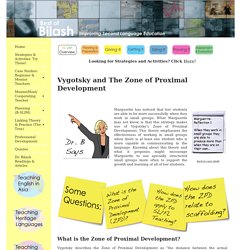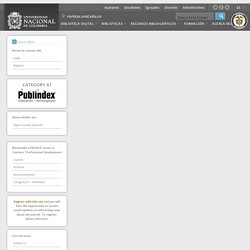

Theoretical Perspective of Play. Play From A Theoretical Point of View 1.

Play and Education -- Hymes Play is a solid means of helping children learn. It is a way for teachers to assess what a child understands and what interests the child. Play exposes his problem-solving skills so that a teacher can know how a child thinks, plans, and organizes. 2. A. as a vehicle for overcoming egocentrism; The egocentrism of the preschool child is characterized by an inability to see or take another person's point of view. 3. A. and the Ego; Erikson believed that the world of play is very important in the early stage of a child's development. 4. Vygotsky believed that play is a means of deferring immediate gratification - instead of tantrums or swallowing the need, the child fulfills needs in fantasy play. 5. Piaget Erikson and Vygotsky all agree that the child uses play for self teaching. Vygotsky. Looking for Strategies and Activities?

Click Here! What is the Zone of Proximal Development? Vygotsky describes the Zone of Proximal Development as “the distance between the actual development level as determined by independent problem solving and the level of potential development as determined through problem solving under adult guidance with peer collaboration with more capable peers” (Vygotsky, 1978). In other words, a student is able to perform certain tasks better under adult guidance or with peer collaboration than what could be achieved alone. The Zone of Proximal Development bridges the gap between what is known (Zone of Current Development) and what can be known. How does the Zone of Proximal Development apply to SL/FL teaching?
The second language classroom is an excellent environment in which to apply the Zone of Proximal Development theory. The successful application of Vygotsky’s theories requires a learning environment dedicated to these principles. Back to top. PROFILE Issues in Teachers' Professional Development. The Role of Discussion Boards in a University Blended Learning Program El papel de los foros de discusión en un programa universitario de aprendizaje mixto Rosa Isabel González Moreno Universidad Nacional de Colombia, Bogotánosemeocurrionombre@hotmail.com This article was received on July 30, 2010, and accepted on December 14, 2010.

Discussion boards as tools in blended English language learning programs have unique characteristics when compared to other synchronous and asynchronous communication tools that are different. Therefore, it is important to investigate the way they operate, their role within a given program and the students', teachers' and tutors' attitudes towards them. Key words: ALEX Virtual English program, blended learning, discussion forums. Los foros de discusión, como herramientas en programas de aprendizaje mixto de inglés, tienen características únicas en comparación con otras herramientas sincrónicas y asincrónicas de comunicación. Introduction Context Participants. Lecture Notes – Lev Vygotsky. Lecture Notes Lev Vygotsky There are very few photographs of Lev Vygotsky.

He didnt live very long (he was 38 when he died), and he was ill with tuberculosis for several years before his death. In spite of his short career, Lev Vygotskys theory started nothing short of a revolution in psychology, education, and in child developmentonce his work was translated in to English, that is. Unfortunately, that didnt begin to happen until the 70s, with Mind in Society. The first time I ever heard of Lev Vygotsky was my first year of graduate school. What if cognition also exists between people? Are you exited yet? Lets get back to the idea of the relationship between social interactions and cognition. Note: Those of you who took my Culture, Ethnicity, and the Family class know I actually have a better graphic than this, but its in the office. Four-Stage Process of ZPD Above: Modified version of Tharp & Gallimore's Four-Stage Model of ZPD (graphics added) Lagniappe: Vygotsky brief bio.
The Four Stages of the Zone of Proximal Development.